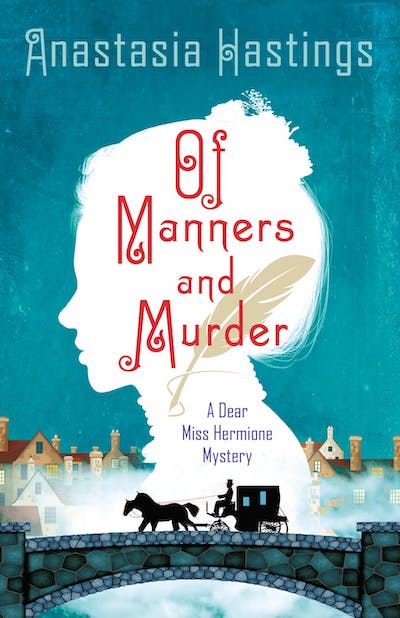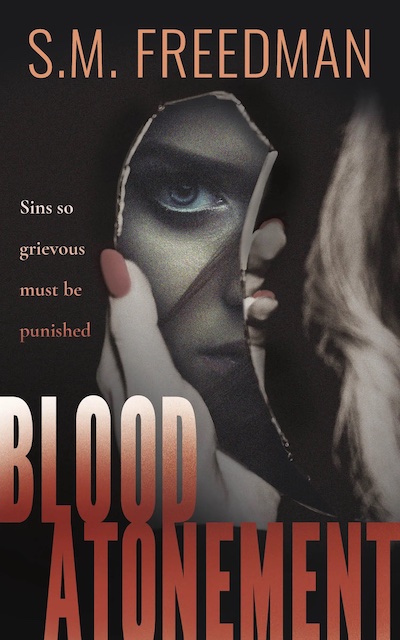Elana knows she should have heeded the red flags. When she met her husband, Jackson, it was a whirlwind romance…a little too whirlwind, as they got engaged within weeks. Right before the wedding, he admits that he was married before, twice, and is twice divorced. He also seems to have rigid ideas about what she and her young daughter, Phoebe, can eat, that she should stay home rather than work, and that every penny she spends should come from him and be accounted for. But he also seems head over heels, as is she. Maybe she’s overreacting? Then on their wedding day, one of his ex wives shows up to warn Elana not to go ahead with the ceremony, claiming that Jackson is a controlling, violent monster who took her daughter, who’s still missing, and will take Phoebe, too. That’s the past portion of the story; flash forward to the present and Elana is in a way-too-real version of the life she was warned about, afraid to stay but even more afraid to go, even if she weren’t penniless and surveilled at every moment. While readers drop deeper into the emotional hole dug by Jackson and feel the walls closing ever tighter, they’ll empathize with every uptick in Elana’s fury and despair. And as they begin to wonder whether it’s possible to kill a fictional character themselves, and how slow a death they could make it, the pages fly by, as do the twists, for better and much worse. Don’t start this on a work night, there’s no hope you’ll put it down.
Henrietta Thornton
Sophocles’ play Antigone, written in 441 BCE, is here pulled into modernity by Burt, a consultant for the United States Holocaust Memorial Museum. The ancient play sees brothers instigate a civil war, and one of their daughters, Antigone, defies her uncle and puts her brother first. So it is in The Dig, which opens amid a civil war, this time in 1993 Sarajevo, Bosnia. Andela, age three, and her brother Mujo, six, are found by American construction-worker brothers in the rubble of a destroyed building, their dead mother nearby. Their Antigone takes place in Thebes, Minnesota, where the children, now called Antonia and Paul, have a “typical American upbringing, blah, blah, no drama,” after being adopted by Eddie King, one of the brothers. Except it’s not really drama free. The blond and hearty residents of Thebes are not ready for the dark-haired, reticent Antonia and Paul, and Eddie dies of an overdose when he can’t handle the new responsibility. What the King family decides for the town is taken as local law, but Antonia defies her Uncle Christopher, graduating from law school and decidedly not working for her family. Paul rebels even more, protesting the Kings’ development of a new shopping area that displaces his Somali immigrant friends and then disappearing. Finding him and getting to the bottom of their pasts, both in Bosnia and more recently, will draw Antonia into a storm of lies and corruption and a fierce battle for control of her life. Feelings when ambition and family collide are no different today than in 411 BCE, and the resulting spectacle is no less captivating.
This is an espionage story with a difference, featuring not a dashing ladies’ man but a young CIA operative, Melvina Donleavy, who knows her bureaucracy and sticks to it, offering an interesting look at modern-day tradecraft. Mel appears to her CIA colleagues to have no special skills, but when she’s in danger, top levels of government get involved. Readers are in on the picture, learning from the get-go that Mel has lifelong recall of every face she sees. It freaked out a middle-school crush when she mentioned having seen him at a sports event that had thousands in attendance, but when she’s sent to Byelorussia in 1990 to see if particular Iranian nuclear scientists can be spotted it’s a handy talent indeed. Mel and her colleagues are undercover, the others posing as accountants who are sent ahead of a U.S. donation to make sure none of it is earmarked for nuclear activity, she as their secretary. The stultifying Soviet observation machine moves into place, with the spies watched everywhere they go and a rigid air of we-know-you’re-spies-and-we-know-that-you-know-we-know coming off their hosts in waves. The group soon hears that a serial killer, the Svisloch Dushitel, or Svisloch Strangler, is at work in Minsk, but as its illegal to even mention the crime of serial killing, Mel has her work cut out to get to the bottom of it. Espionage, a love story, and murder mystery, all by a Department of Defense contractor assigned to the former Soviet Union in the ‘90s? Yes, please.
Ready for a psychological game? Liz Bennett wasn’t, but that’s what her marriage has turned out to be—but is the game a one-sided figment of her imagination, or is her husband, Arno, an adulterer who’s playing her along? The backdrop to the maybe game is deep unhappiness and insecurity on Liz’s part. She and Arno are new parents, and motherhood is more difficult than she imagined. It’s not very enjoyable, with baby Emma looking at her “like she’s an elderly spinster I’m grooming for her banking information,” and no time or energy to write a follow-up to her semi-successful first novel. At least she has Arno, who’s worried about his wife’s happiness and shows love and support for her at every turn—a steadfast situation that she’s terrified to lose after she sees a text to him from an attractive coworker, a message that could signify a romance. Liz is soon spiraling into an abyss of fear and suspicion, one that’s incredible enough to keep readers turning the pages but believable enough to elicit real empathy for this broken soul. Sullivan has a way with characters, using dialog and Liz’s astute, cutting observations to bring Arno, crunchy-granola nanny Kyle, and bitchy-perfect sister-in-law Rose (“I’ve been up since 4 a.m.”) to gossip-worthy life. Fans of women’s fiction will eat this up.
Crimes and investigators that could not be more different collide in Donlea’s immersive thriller. The first crime is the obscure possible suicide, possible murder of a man who’s found hanging off his balcony in the Catskills area of upstate New York on July 15, 2001, and the other the murder of thousands in downtown New York City 27 days later. The investigators are Avery Mason, a glamorous, up-and-coming TV journalist and Walt Jenkins, a burned-out, former FBI agent who’s now living in Jamaica and steadily becoming an expert on rum. Fate brings the crimes and sleuths together when, twenty years later, a stunned medical examiner finds a match to a body part from the wreckage of the World Trade Center. It’s from a woman who was under investigation for the killing of the hanged man, and Walt, who investigated that hanging in 2001, and Avery, who’s breaking the story of the 9/11 victim and hoping to prove the woman’s innocence, are pushed together (not exactly against their will, it turns out) to get to the bottom of the decades-old case. There are many twists here, both in the backgrounds of the characters and in the secrets that are revealed. The tragedy of 9/11 is not taken lightly, rather it forms a fittingly sober backdrop to the torment faced by the characters in the past and today. For a readalike, try a series character who on the surface is nothing like Walt Jenkins, but who has the same kind of rock-steady kindness and intelligence: Kate Atkinson’s Jackson Brodie
Living a remote, punishing existence—he even asks to have the power to his cabin switched off in the Minnesota winter—former homicide detective Max Rupert has run away from his job more than retired from it. All readers know for most of the book is that he shoved a man through a hole in a frozen lake and is living with the aftermath of that choice. But why he did it, and whether he can allow himself to rejoin society, is a mystery. On a visit to town he runs into Lyle Voight, the former sheriff who’s been voted out of the job in favor of a corrupt newbie, and the man’s daughter, Sandy, and grandson, Pip. Seeing a family gives Max an unfamiliar and slightly disturbing feeling—happiness—and he’s helplessly drawn to jump in when, shortly after, Sandy and Pip vanish suddenly from their home. Puzzlingly, all signs point toward a planned absence. Next, we meet the sinister—and I mean sinister—duo behind the disappearance, and soon the chase is on, helped by Max’s former partner, Niki Vang. This thriller does a remarkable job of contrasting evil and love throughout, in the characters’ actions and dialog as well as in Max’s inner struggle between the positive force that keeps him going and the weight of self-loathing that holds him back. The three-dimensional portrayal of Niki, a wise-cracking and kind Vietnamese American detective and love interest, is a bonus. This is one to get lost in.
Alyssa, née Alice, Macallen, has changed her name and subjugated everything else about herself to please her unpleasable husband, Bill, who has left with no explanation. All Alyssa knows for sure is that he’s taking his wealth with him and she has no job and no prenup, which he insisted was unnecessary because he was going to love her forev—you know the rest. Anyway, Bill’s gone and Alyssa’s sitting in a hotel bar nursing her sorrows when she meets a woman who may be even worse off. Bree Lorrance is living at the hotel after getting away from an abusive boyfriend. She moves into Alyssa’s guest house, and soon readers and Alyssa are wondering how things have taken such a fast turn. Far from lonely and terrifying, Alyssa’s days are now taken up with helping her friend, who encounters a new tragedy that sets the women, and another player who becomes involved and moves in, on an exciting trajectory. We’re left wondering whom Alyssa can trust in her new life, if anyone. Are some of these strange new people part of Bill’s team or out to get her for some other reason? Or maybe Alyssa is making everything up and we’ve got an unreliable narrator on our hands…it’s impossible to know until Ryan brings all to a satisfying ending that readers will never see coming. The author’s fans will snap this up; it’s also a must for Liane Moriarty’s readers.
“The right choice can be made to seem impossible, especially for a woman on her own,” learns “spinster” Violet Manville during her work as Miss Hermione, agony aunt for A Woman’s Place magazine. The usual Miss Hermione is Violet’s actual aunt, Adelia Henrietta Georgina Tylney Manville. When the feisty lady sets off from England for the Continent with her gentleman friend, she reveals that she is the mysterious author of the popular column and helpfully sets the shocked Violet up with folders of advice that have labels such as “Comportment,” “Mourning,” and “Mothers in Law.” Violet makes the right choice for herself, breaking out of her life as the studious, ignored, half-sister of the beautiful, flighty Sephora, who has an inheritance, which for a woman in 1865 is everything. Being unmarriageable frees Violet from some of the social duties Sephora adores, allowing her to visit a young woman who wrote to Miss Hermione for help. But when Violet reaches Ivy Armstrong’s village, she finds a very different scene from what she expected, and a murder investigation is soon afoot. Further choices abound, with Hastings keeping her hero within the boundaries of what a Victorian lady can do, while showing what life is like within those strictures and what happens when a woman has her freedom of choice stolen. Readers will empathize with Violet and even with her sad, social-climbing sister, both of whom are doing their best with what life’s dished out. Funny at times, this series debut is also an adventurous and thoughtful look at a time when women’s lives were on the brink of change. And it’s a puzzling whodunit to boot.
The supposed hero of this book is Captain Edward Heywoud, a paragon of colonial manliness who “[trails] ambition and resolve.” For years, he’s climbed the world’s highest peaks, sometimes with his photographer wife, Viola Colfax. Now, in 1910, he and long-time climbing companion James Watts and several other hardy men and their sled dogs are tackling the ultimate challenge: to reach the South Pole. And not just make it there, but do so before a Norwegian expedition claims the glory for its king rather than England’s. In a parallel struggle is Viola, who also isn’t the book’s hero, fascinating though she is. She’s in love with Edward, although he disapproves of many of her activities and is fond of telling her what she will do, but she also loves the gentler James, and the two are having an affair. While the men are away—a voyage chronicled in gripping and often horrible detail by author Lazaridis—Viola takes on the challenge of documenting the suffragette movement, a project interrupted when the men return and their photographs lead her to think their triumph is a fraud. As to the hero here, it’s not a particular person but the bodies described in this gorgeous and devastating work: James’s and Edward’s in Antarctica as they compare the calories they use against the remaining food and end up eating their dogs; the hunger-striking suffragettes, whose emaciated, police-battered bodies feature in a fascinating project by Viola; the steadfast figure of Mary, Edward and Viola’s maid, who indirectly makes the expeditions possible but is taken for granted by the family; and the body of the Earth, which tries to kill the men even as it enables their fame. The frustrating, brilliant Viola is one of my favorite characters, and this book one of my favorite reads, in a long time.
Locked-room mysteries and thrillers are booming, but this one has a twist. In the 1990s, young Grace DeRoche’s family lives in a Canadian branch of the FLDS, the Fundamentalist Church of Jesus Christ of Latter-Day Saints. Talk about a locked room. Children in the cult headed by Warren Jeffs, who in real life has only left the FBI’s Most-Wanted list because he’s serving a life sentence for child sexual assault, live with their fathers and the men’s multiple wives in Brigham, a secretive, abusive compound. They spend their days praying, in fear of outside-world apostates, are illiterate, and are subject to harsh “corrections.” Girls are married young to much older men. After the police come and “Brigham’s Ten”—Grace and nine other children—escape, the rest of the compound dies by mass suicide. In the years that follow, Grace remains in the locked room of her mind: she has dissociative identity disorder, with multiple personas taking over when she’s stressed. Stress comes in the deaths of members of the Ten, and Detective Beau Brunelli must protect Grace, a challenge when the woman doesn’t believe she needs protection and is too frightened and confused to accept help. Freedman could have made this sensationalist, but it’s a thought-provoking read, providing a look at life after a cult and portraying the survivors as real people, warts and all. The shocking ending here is a reward of its own, and getting there is a journey through incredible details of life inside Warren Jeffs’ world and inside the mind of a troubled woman. While you wait, try the Netflix documentary Keep Sweet: Pray and Obey, which covers the FLDS and is also absorbing.










